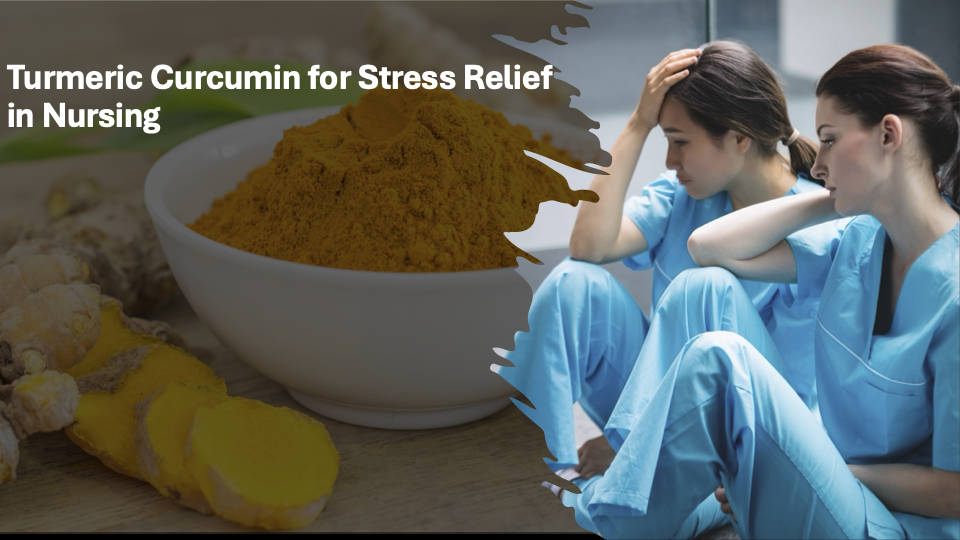Introduction to Turmeric Curcumin
Turmeric is a bright yellow spice commonly used in cooking and has been a cornerstone of Ayurvedic medicine for centuries. The active compound in turmeric, curcumin, is renowned for its potent anti-inflammatory and antioxidant properties1. In modern times, curcumin has gained attention for its potential health benefits, including stress relief and overall wellness.
Understanding Stress in High-Level Jobs Like Nursing
Nursing is a demanding profession that often leads to high levels of stress. The physical and emotional strain can impact both mental and physical health, causing symptoms such as anxiety, depression, fatigue, and chronic pain. Managing stress and depression is crucial for maintaining the well-being of nurses and ensuring they can perform their duties effectively.
Curcumin and Depression – Mechanism of action
Curcumin, a well-documented anti-inflammatory and antioxidant compound found in turmeric, has recently shown promise in treating depression. Researchers are exploring its mechanisms of action2, which involve brain signaling and reducing inflammation in the brain. Some of the action mechanisms proposed include:
- Modulation of Neurotransmitters: Curcumin has been found to influence the levels of serotonin, dopamine, and norepinephrine – the chemical messengers that regulate mood.
- Anti-Inflammatory Properties: Curcumin has anti-inflammatory properties, which can be helpful for depression because some research suggests there’s a link between inflammation and feeling down.
- Neuroplasticity: Curcumin might help your brain be more flexible by promoting neuroplasticity. This means your brain can form new connections, which is important for regulating your mood.
- Neuroprotection: The anti-oxidant action of curcumin acts like a shield for your brain cells, protecting them from damage that can contribute to depression.
- Manage stress response: Curcumin may help regulate the hypothalamic-pituitary-adrenal (HPA) axis, which plays a role in the body’s response to stress and is often dysregulated in depression
- Calming overactive Neurons: Curcumin has been shown to inhibit excitotoxicity, a process where nerve cells are damaged or killed by excessive stimulation, potentially contributing to anxiety and depression
- Mood and stress balancer: Curcumin can modulate the endocannabinoid system, which plays a role in how you feel and how you handle stress.
These mechanisms collectively contribute to the potential antidepressant effects of curcumin and highlight its multifaceted approach in addressing the complex nature of depression
Insights from Pre-Clinical and Clinical trials
Several studies have demonstrated curcumin’s effectiveness in reducing stress3 and improving cognitive health4. A review of Pre-clinical and clinical evidence2 provides valuable insights supporting the benefits of curcumin in managing depression and anxiety.
Pre-clinical Studies
- Pre-clinical studies in animal models have demonstrated that curcumin exhibits antidepressant-like effects by influencing neurotransmitter levels, such as serotonin and dopamine, and modulating neuroplasticity.
- Curcumin has shown anxiolytic properties by reducing anxiety-like behaviors in animal models.
- Its anti-inflammatory, neuroprotective, and stress-regulating effects have been observed in pre-clinical studies, suggesting a multifaceted approach to managing depression.
Clinical Trials
- Human clinical trials have shown that curcumin may have antidepressant effects in individuals with major depressive disorder, with improvements in depressive symptoms reported.
- Some studies suggest that curcumin’s anti-inflammatory properties may play a role in its antidepressant effects, supporting a personalized treatment approach based on inflammatory biomarkers like high-sensitive CRP (C-reactive protein), based on inflammatory status.
- Curcumin has been well-tolerated in clinical trials, with mild side effects reported at higher doses. Its safety profile makes it a potentially attractive option for individuals seeking alternative or adjunct treatments for depression and anxiety.
Overall, the evidence suggests that curcumin holds promise as a natural remedy for improving mood, alleviating symptoms of depression and anxiety.
Benefits of Curcumin for Nurses
Curcumin offers numerous benefits for nurses, including:
- Reduction of inflammation and joint pain from physical strain.
- Support for mental well-being by enhancing mood, reducing anxiety and depression symptoms.
- Boosting immune function to combat stress-induced susceptibility to illness.
Practical Ways to Incorporate Curcumin into Daily Routine
Nurses can incorporate curcumin into their daily routine through dietary sources like adding turmeric to meals and beverages. Additionally, curcumin supplements are available in various forms, with recommended dosages to ensure optimal benefits. Turmeric curcumin can be a valuable addition to the wellness regimen of nurses and other high-stress professionals. By incorporating curcumin into your daily routine, you can potentially manage stress more effectively and improve your overall well-being. Always consult with a healthcare provider to explore the benefits of curcumin for optimal stress management and health.
References
1. Ahsan R, Arshad M, Khushtar M, et al. A Comprehensive Review on Physiological Effects of Curcumin. Drug Res (Stuttg). 2020;70(10):441-447. doi:10.1055/a-1207-9469
2. Ramaholimihaso T, Bouazzaoui F, Kaladjian A. Curcumin in Depression: Potential Mechanisms of Action and Current Evidence-A Narrative Review. Front Psychiatry. 2020;11:572533. doi:10.3389/fpsyt.2020.572533
3. Lopresti AL, Drummond PD. Efficacy of curcumin, and a saffron/curcumin combination for the treatment of major depression: A randomised, double-blind, placebo-controlled study. J Affect Disord. 2017;207:188-196. doi:10.1016/j.jad.2016.09.0474.
4. Tsai IC, Hsu CW, Chang CH, Tseng PT, Chang KV. The Effect of Curcumin Differs on Individual Cognitive Domains across Different Patient Populations: A Systematic Review and Meta-Analysis. Pharmaceuticals (Basel). 2021;14(12):1235. doi:10.3390/ph14121235
5. Lopresti AL. Potential Role of Curcumin for the Treatment of Major Depressive Disorder. CNS Drugs. 2022;36(2):123-141. doi:10.1007/s40263-022-00901-9

